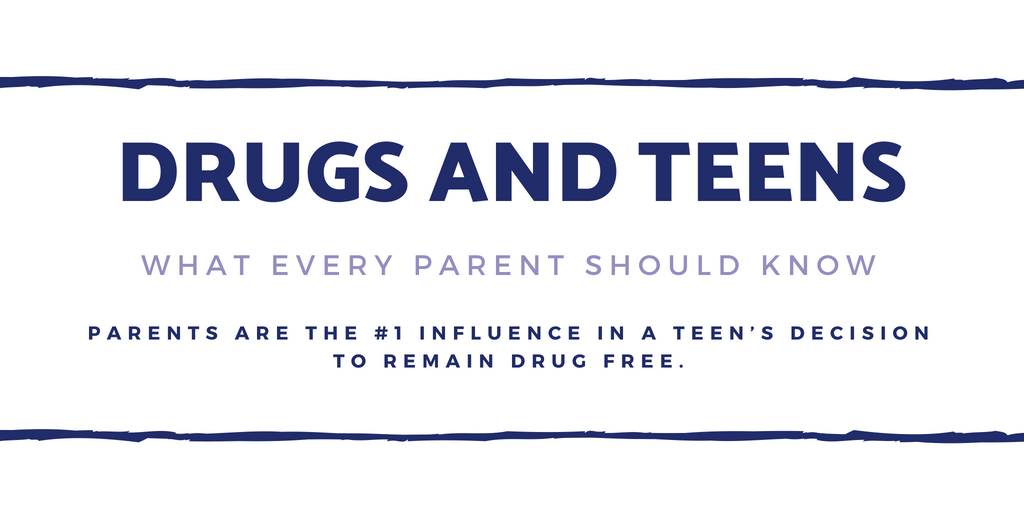
Did you know? After marijuana and alcohol, prescription drugs are the most commonly abused drugs among Americans age 14 and older (NIDA). With the growing opioid crisis, it is becoming more apparent just how many lives can be touched by drugs, including those of youth. It’s a common misperception that substance abuse is an “adult issue.” However, the average age for first time nonmedical prescription drug use is 13-14, and about 2/3 of teens say they get their prescription drugs from home medicine cabinets (Foundation for a Drug-Free World). Many teens believe that prescription drugs are much safer than illegal street drugs because they are prescribed by a doctor, even though overdose deaths involving opioids (both prescription and illicit types) are higher now than they have ever been. The importance of communicating with our teens about keeping a drug-free lifestyle has never been greater.
Reasons Teens Engage in Substance Abuse
Teens use tobacco, alcohol and other drugs for a number of reasons. Peer pressure and a desire to fit in with social groups are often at the top of the list. Because of misperceptions that “everyone is doing it,” teens are more likely to try drugs because they think it’s normal. Other teens report drug use include boredom, depression (as a way to escape), weight loss, to deal with stress and to enhance experiences (such as for studying or to relax in social situations). In addition, some teens may be genetically predisposed to becoming addicted to drugs if they have a family history of addiction (DrugAbuse.com).
Warning Signs of Substance Abuse
Though you may not currently think there is a need to know these signs, it’s always a good idea to be informed. According to Psychology Today, parents should be aware of certain warning signs for teen drug abuse, including:
- Severe mood swings
- Extreme changes in sleep habits
- Physical indications like weight loss, slurred speech, extreme anxiety or panic attacks
- Sudden changes in friend groups
- Self-harm
- Loss of pleasure in activities
How to Communicate with Your Kids About Drugs
The best thing a parent can do to prevent teen substance abuse is to keep lines of communication open. Having ongoing conversations about tobacco, alcohol and other drug use is key to ensuring your teen feels supported in making healthy choices. In fact, according to NCADD, “research has shown that kids who have conversations with their parents and learn a lot about the dangers of alcohol and drug use are 50% less likely to use alcohol and drugs than those who don’t have such conversations.” This is because these conversations not only help them separate facts from fiction, but they also help form their attitudes and decisions around substance use. Parents are the #1 influence in a teen’s decision to remain drug free. Several great resources are available to assist parents in having these conversations:
- Parents Magazine – Did you know that it is never too early to start developing an ongoing dialogue with your kids? Beginning as young as preschool-age, you can convey important messages in an age-appropriate manner to lay the foundation for years of honest conversations. As kids grow and develop, conversations can progress with their age, maturity and social experiences.
- Ask, Listen, Learn – It is helpful to keep certain guidelines in mind when having these important conversations with your kids. You can encourage safe, honest dialogue by listening before you talk, asking them open ended questions, sharing your family history of substance abuse, remaining positive and being clear about your expectations.
- Partnership to End Addiction – You can become more connected with your kid by engaging in meaningful conversations based on trust and mutual respect. Being intentional about setting times to talk, taking advantage of “teachable moments” and offering empathy and support are a few ways you can break down communication barriers and truly connect.
Another great resource to review is GUIDE’s Power of Parents Inspired to Make Healthy Choices newsletter.
Action Beyond Talking
Preventing prescription drug abuse begins at home. In addition to paying attention to your teen’s behavior and having important conversations, a great way to protect your family and home is to change how you think about prescription drugs on a day-to-day basis and examine ways to limit access by locking up your prescriptions, keeping an inventory of medications on hand and disposing of expired, unused or unwanted prescriptions. Learn more about how to do these things here.
When parents commit to having ongoing dialogue and making lifestyle changes like the ones mentioned above, teens will be more likely to make positive and healthy choices.
